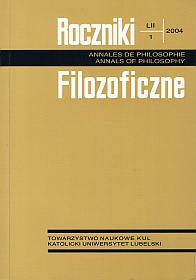Natural sciences in the process of cultural transformations: towards interdisciplinary dialogue
Abstract
Cultural changes in recent times have brought about a profound change in valuations regarding the social role of natural sciences. While in the early twentieth century positivism saw science as the only source of valuable knowledge, postmodernism at the beginning of this century treats natural theories primarily as a form of literary narrative. In anti-intellectual moods that express criticism of the Enlightenment affirmation of rationality, the pragmatic applications of science are valued, not its cognitive functions. Such a situation creates an urgent need for interdisciplinary cooperation between philosophers, theologians and representatives of natural sciences. Recently, interdisciplinary research programs have been undertaken in many centers, concerning various aspects of the theory of evolution, the relationship between information processing in computers and neurophysiology, the relationship between methodological naturalism and various versions of ontological naturalism.
The research in this area introduces a new quality in the mutual relations between natural sciences and Christian thought. This research overcomes both the illusions of scientism and the partial concept of truth that dominates positivism, which lacks answers to questions essential for a comprehensive vision of the world. At the same time, they also respond to the vision of an interdisciplinary dialogue that John Paul II presented in the encyclical Fides et Ratio and in the Letter to George Coyne SI, addressed on the 300th anniversary of the publication of Newton's Principia.
References
Barnett L.: The Universe and Mr. Einstein, New York 1962.
Capra F.: The Tao of Physics Revisited, in: The Holographic Paradigm, Boston: Shambhala 1982, pp. 216-229.
Coyne G.: Chaos and Complexity, Città del Vaticano 1995.
Coyne G.: Quantum Cosmology and the Laws of Nature, Vatican City State: Vatican Observatory Publications, and Berkeley: The Center for Theology and the Natural Sciences 1993.
Coyne G.: The Neurosciences and the Person, Città del Vaticano 1999.
Fukuyama F.: Our Posthuman Future. Consequences of the Biotechnology Revolution, Farrar, New York: Straus and Giroux 2002.
Green B.: The Elegant Universe. Superstrings, Hidden Dimensions, and the Quest for the Ultimate Theory, New York: Vintage Books 1999.
John Paul II: Message of His Holiness Pope John Paul II, in: Physics, Philosophy and Theology, ed. R. Russell et al., Vatican City State: Specola Vaticana 1988, M1-M14.
Peacocke A. R.: Creation and the World of Science, Oxford: Oxford University Press 1979.
Pence G. E.: Who’s afraid of human cloning?, New York: Rowman & Littlefield 1998.
Russell R. J., Stoeger W. R., Ayala F. J. (ed.): Evolutionary and Molecular Biology, Città del Vaticano: Vatican Observatory 1998.
Życiński J.: Dimorare all’ombra della sapienza, in: Per una lettura dell’Enciclica Fides et ratio, Città del Vaticano 1999, pp. 188-198.
Życiński J.: L’evoluzionismo secondo il pensiero di Giovanni Paolo II, «Euntes docete», 56 (2003), n. 1, pp. 59-67.
Życiński J.: Physics and Culture in the XXI Century, «Seminarium», 41 (2001), pp. 175-186.
Życiński J.: The Human Person as the Image of God and Basic Human Values, «Analecta Cracoviensia», 2003.
Życiński J.: The scientist and human values, in: Walter Kohn, Personal Stories and Anecdotes told by Friends and Collaborators, ed. M. Scheffler, P. Weinberg, Springer 2003.
Copyright (c) 2004 Roczniki Filozoficzne

This work is licensed under a Creative Commons Attribution-NonCommercial-NoDerivatives 4.0 International License.





